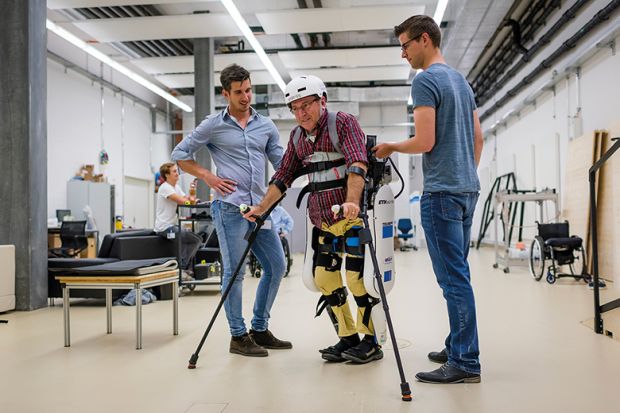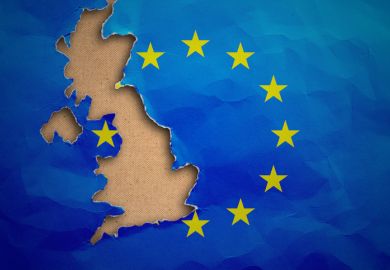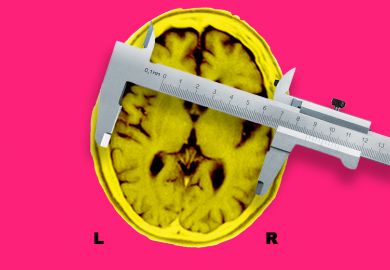The UK must have the “will to develop Europe”, including the poorer east of the continent, if it wants to remain in future European Union research programmes, according to the president of the bloc’s most successful research network.
Martin Stratmann, president of Germany’s Max Planck Society, took aim at the UK’s utilitarian attitude towards collaboration with the EU in an interview with Times Higher Education at the society’s headquarters in Munich.
The UK has said it wants to be part of Framework Programme 9, the successor to the current €80 billion (£70 billion) Horizon 2020 programme, although MEPs have insisted that it could not be part of decision-making processes once it leaves the EU and cannot get back more money than it pays in.
A “total split” between UK and EU science would be unacceptable, Professor Stratmann said of Brexit. “First of all, we always have scientific collaboration between countries even if you are not in a joint economic area,” he said. Germany collaborates “like hell” with the US, he pointed out, so links will continue “in any situation”.
Professor Stratmann – who visited Brussels last November to meet Carlos Moedas, commissioner for research, science and innovation – said he was lobbying for a “European science area that includes Britain, whatever that may be”. This could include FP9, he said, or other frameworks, such as Cern or Euratom. “There are many structures that are possible,” he added.
But, speaking about future framework programmes, he warned the UK: “Europeans think that it is more than just a source of...financial resources.
“It’s also the common will to develop Europe”, an impulse “born after the Second World War”, he argued. “We have gone 70 years without anybody killed in any war between European countries, which, in our 1,000-year history, is rarely matched,” he continued.
During the referendum campaign, remain-supporting researchers often focused on the UK’s success in winning grants from Europe. The Royal Society calculated in 2015 that the UK got billions of euros more out of European research than it theoretically paid in.
However, the UK government’s recent position paper on FP9 strikes a less utilitarian tone – with no specific euro figures in or out – arguing that the UK has “contributed towards the programme’s benefits to citizens across Europe”.
“We have the need to invest in eastern Europe, so we see this continent grow together after the [fall of the] Iron Curtain,” said Professor Stratmann. FP9 is “part of that development process – it’s not just a science collaboration”, he said.
Last year, the society announced a €10 million plan to set up Dioscuri Centres – research groups based at Polish institutions – as part of its plan to extend cutting-edge science into central and eastern Europe. “I think Britain has to understand, if you are part of that process to develop the continent, you are part of the team, and you have to invest also. And you have to take certain burdens also,” he said.
If the UK’s attitude in Brexit negotiations was one of “teaming up to make some profit financially” then the room for collaboration would be “more narrow”, he said.
Professor Stratmann also outlined his hopes for the next EU research framework – the shape of which is now under debate in Brussels – which will start in 2021.
There is a new focus on innovation and commercialisation from the European Commission, a potential headache for a science-orientated organisation such as Max Planck, by some way the biggest winner of funding from Horizon 2020.
A proposed European Innovation Council, which planners hope will help new ideas become companies and make up for Europe’s lack of venture capital compared with the US, is a good idea but lacks detail at the moment, Professor Stratmann said. “From a great idea to a great result you need some concept.”
One useful model would be the US Defence Advanced Research Projects Agency, Professor Stratmann said, which sets up competitions and gives out prizes for technological breakthroughs. He also praised its scouting function, which seeks out researchers who often “don’t even know they are doing some great stuff in innovation”, and backs them with new money.
But such a model risks repeating the problems of the European Research Council by simply showering money on already highly innovative, wealthy regions of Switzerland, Germany and France, he said. It needs to help areas that are “lagging behind” as well as seeking out the very best, he added.
Register to continue
Why register?
- Registration is free and only takes a moment
- Once registered, you can read 3 articles a month
- Sign up for our newsletter
Subscribe
Or subscribe for unlimited access to:
- Unlimited access to news, views, insights & reviews
- Digital editions
- Digital access to THE’s university and college rankings analysis
Already registered or a current subscriber?








